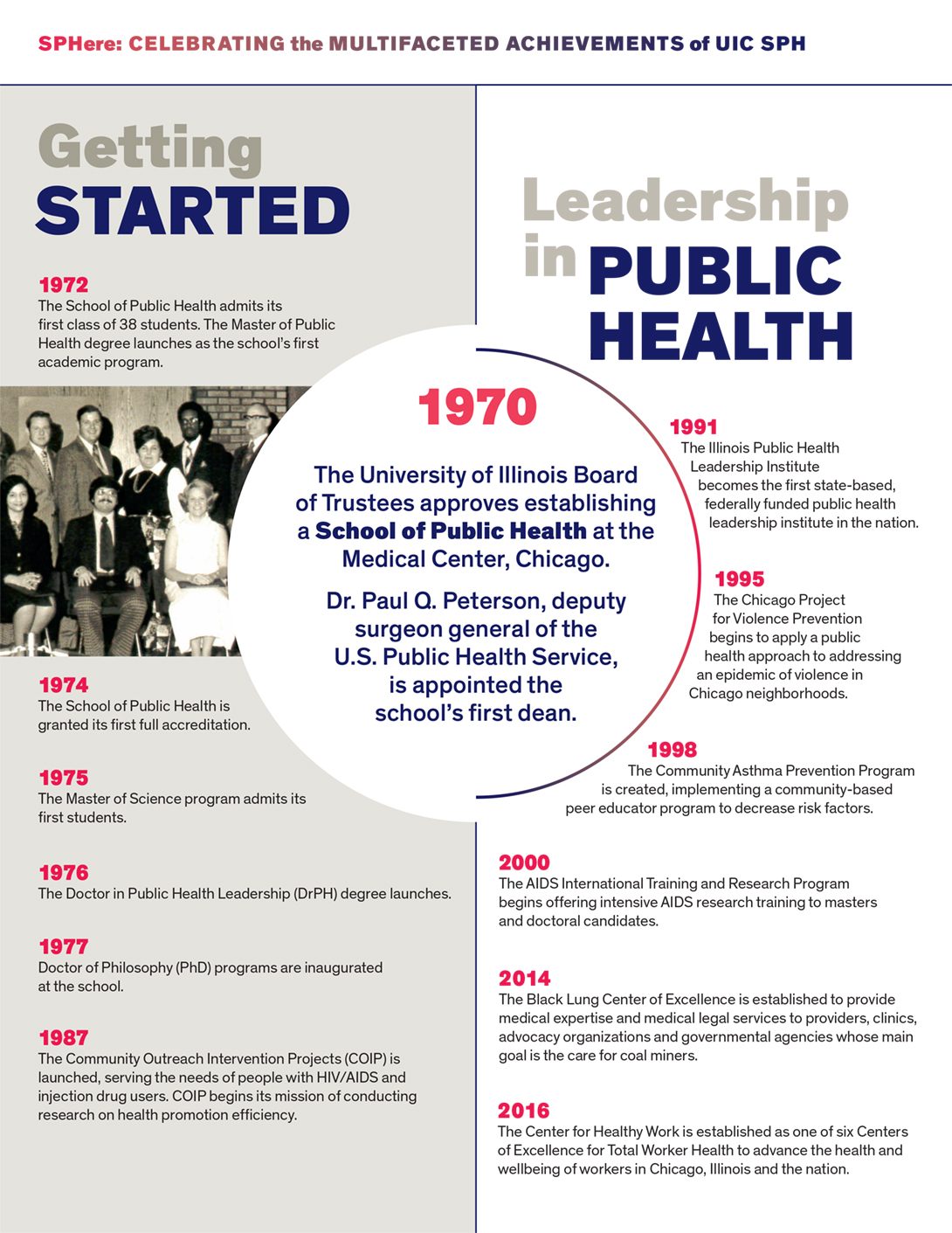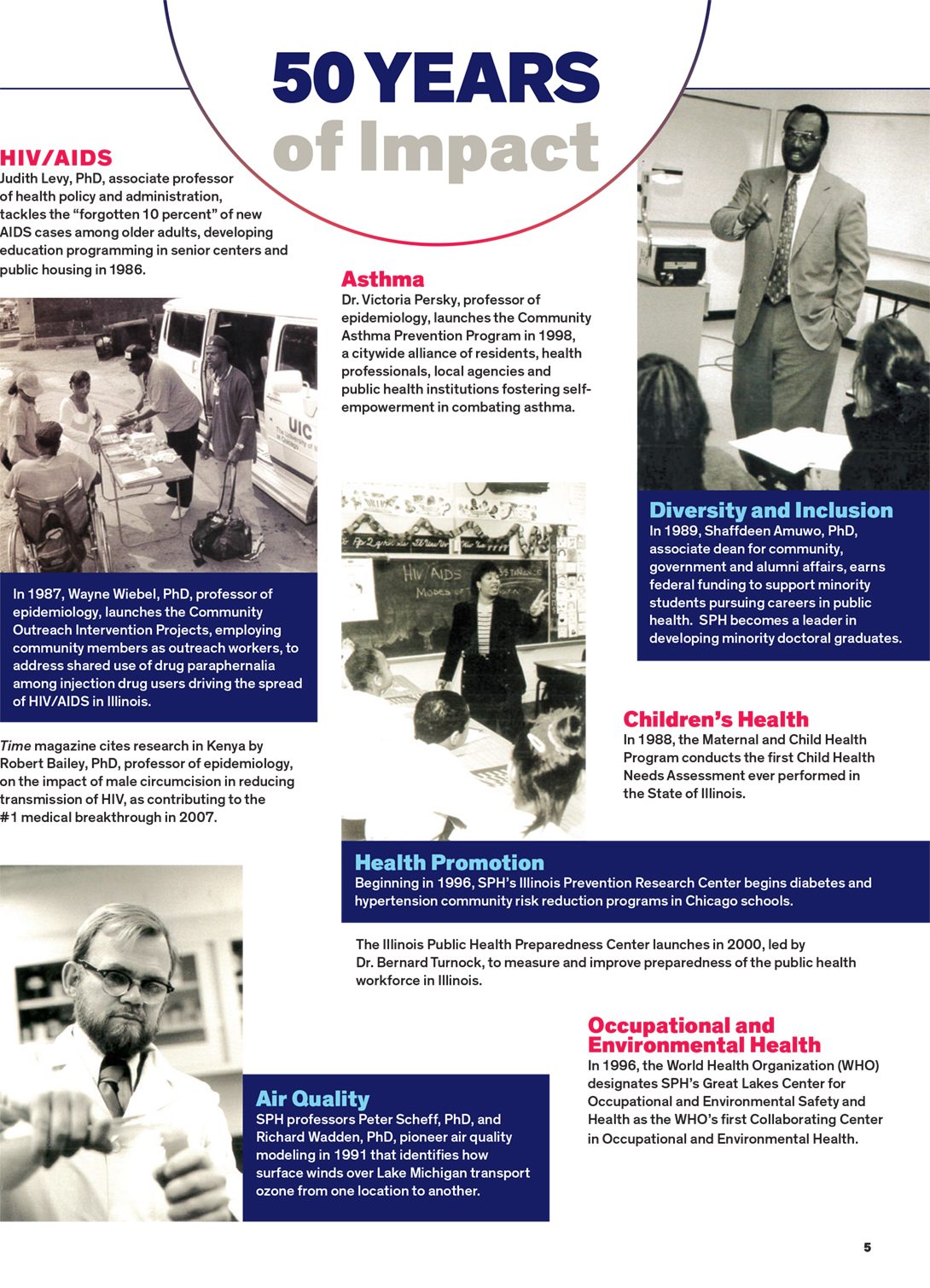50 Years of Impact

The UIC School of Public Health celebrates its 50th anniversary in 2020.
With the passage of Medicare and Medicaid in 1965, tens of millions of Americans gained access to formal health care systems. With the rise in patient care came demand for public health professionals to provide a scientific basis for decision-making in health services. At the same time, the ongoing Civil Rights Movement and the 1968 Democratic National Convention in Chicago brought into focus social, economic and health inequities plaguing American society.
In 1970, with its fledgling mission borne from these events preceding it, the State of Illinois’ first fully accredited school of public health launched at what was then known as the University of Illinois Medical Center, Chicago. Fifty years onward, the UIC School of Public Health remains the only fully accredited school of public health in the state.
It’s a nice accolade, but a better calling card is the school’s history of meeting the evolving public health needs of communities in Chicago and around the globe.
From the first class of 38 students, working with 22 faculty members in one degree program (our Master of Public Health), the School of Public Health has grown over the past half century, now featuring six degrees ranging from undergraduate to doctoral study with a range of concentrations.
From its first days, the school has developed an active public health practice responsive to the needs of the people of Chicago and the State of Illinois. The Maternal and Child Health Program, started in 1983, began advancing health for women and children across the socioeconomic spectrum. The Community Outreach Intervention Projects, launched in 1987, tackled the spread of HIV/AIDS across Illinois. Many years later, these programs continue to serve the needs of populations facing barriers to access to health services.
The school’s research has long been defined by its basis in the community and the emphasis on translational research, paralleling the school’s public health practice. The Prevention Research Center, founded in 1987, brought analysis to the effects of health promotion efforts and the prevention of major causes of premature death and disease in the U.S. Research in 1993 highlighting the high rates of death from asthma in Chicago and prevalence of asthma in Chicago children led to the founding of the Chicago Community Asthma Prevention Program in 1998.
“Over the last 50 years, the School of Public Health has focused on issues of health equity and social justice,” said Wayne H. Giles, MD, MS, Dean of the School of Public Health. “As we look to the future, we will continue to ensure our focus on equity has an impact on communities here in Chicago and beyond.”
A Look Back at Our History

An accessible version of this graphic is available at the link below.
50 Years of Impact

An accessible version of this graphic is available at the link below.
What will public health look like 50 years from now?
My hope is that the emphasis on public health perspective and the significance of social determinants will continue to strengthen over the next 50 years, to the point where our organizational and professional silos recede and we learn and practice healthcare in a holistic, multi-dimensional fashion that embraces public health as a foundational framework.
| Clinical Assistant Professor of Health Policy and Administration
More quotes on public health's future
Public health is aggressively working toward being at the forefront of innovation and change in healthcare. Fifty years from now, public health will be innovation, transformation, new technology and research. Public health will lead the pack in helping populations of people achieve optimal health and quality of life.
| MPH in Health Policy and Administration ‘15
More quotes on public health's future
I expect that public health will be much more ‘mainstream’ than it was even 10 years ago. As an undergrad student, I had to Google what an MPH was since none of my mentors were really familiar with it, and now already there are so many more public health programs for undergrads.
| MPH in Epidemiology ‘10, PhD in Occupational and Environmental Epidemiology '15
More quotes on public health's future
“I would like to think that in 50 years’ time, we can be looking further into how we can better address climate change and look back at the lack of action we’re taking now and prove again how serious the need is to be taking these research steps and taking action, and that we can use that to always advocate for more research and more funding.”
| MPH in Environmental and Occupational Health Sciences student
More quotes on public health's future
“In 50 years, public health will be an equity leader, known most for the public in public health. Our expertise will be not only a science of topical disciplines but also a science of authentic engagement, capacity building and collective action toward transformational change. Health will not be about our choices; it will be about co-creating inclusive and equitable opportunities for everyone in every way.”
| Clinical Assistant Professor of Health Policy and Administration
More quotes on public health's future
“I think public health in the future will have a larger role in healthcare and will help encourage more preventive measures. Hopefully there will be more collaboration and communication between medical and public health professionals. Most importantly, I think shifts in policies will help make it easier to implement public health solutions.”
| BA in Public Health student
More quotes on public health's future
“I see public health leaders advancing the use of surveillance data to tackle the wicked emerging public health problems we will face in the future. I believe that capturing health data via electronic devices such as personal trackers, Fitbits and smart watches could be used in conjunction with listening and learning from the very individuals we seek to serve. This has the potential to greatly improve the health and well-being of populations.”
| Senior Public Health Advisor, Centers for Disease Control and Prevention
More quotes on public health's future
“I believe that in 50 years, technology will have taken over healthcare. Patients will have more control over medical decisions and access to care via the use of smart phones, telemedicine and virtual digital assistants. I believe that this advancement in technology will decrease the impact of disease, make for more affordable care and ultimately, the need for hospitalizations will fade away.”
| Master of Healthcare Administration student